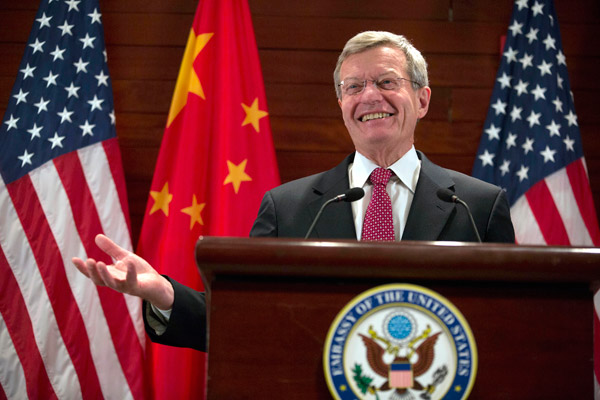 Chinese artists from Flight MH370 and their art
Chinese artists from Flight MH370 and their art
 Top 30 entrepreneurs under 30 in China
Top 30 entrepreneurs under 30 in China
 800-year-old ancient village in Shanxi
800-year-old ancient village in Shanxi
 World's top 10 most prestigious institutions
World's top 10 most prestigious institutions
 Chinese airborne troops conduct low altitude flight training
Chinese airborne troops conduct low altitude flight training
 Beautiful fisherwomen in SE China
Beautiful fisherwomen in SE China
 1,500-year-old coffin excavated from grassland in N China
1,500-year-old coffin excavated from grassland in N China
 See what Google glass captures at 'two sessions'
See what Google glass captures at 'two sessions'
 In pictures: beautiful women in different ages
In pictures: beautiful women in different ages
 |
| Max Baucus holds his first news conference as US ambassador to China in Beijing on Tuesday. |
Baucus sets himself goal of visiting every province in China
Avid runner Max Baucus set himself an energetic target when he made his debut as US ambassador to China in Beijing on Tuesday.
"The Chinese philosopher Laozi famously said a journey of 1,000 miles begins with a single step," Baucus said at a news conference.
The envoy said he will follow this advice and promised to "get out of the office, out of Beijing and travel around China as much as possible".
"The ambitious goal is to travel and visit every province and region in China," he said.
The 72-year-old envoy, who has a wealth of experience in dealing with China, spoke of three goals.
These are to strengthen economic relations between the world's two largest economies, cooperate with China on common global challenges, and deepen ties between the people of the two nations.
He vowed to handle economic issues in a way that is mutually beneficial and that ensures a level playing field for American businesses and workers to compete fairly with Chinese counterparts.
Baucus, who has been chairman of the Senate Finance Committee since 2007, has taken a hard line against China's trade practices, currency exchange rate and intellectual property rights protection.
Niu Xinchun, an American studies researcher at the China Institutes of Contemporary International Relations, said the comments by Baucus were not unexpected.
"It is normal for the US ambassador to make remarks on behalf of US interests. The goals reflect Washington's focus on China policies."
Niu said the main job of an ambassador is not to make decisions but to act as a bridge linking two governments.
"In that regard, Baucus is a good choice. He is an ambassador who can directly call the US president," he said, citing good personal relations between the envoy and US President Barack Obama.
Baucus also told Chinese and international media that he would do "everything possible to strengthen the people-to-people ties between us, including students, tourists, businesspeople and others", which he said will promote greater mutual trust.
His predecessor Gary Locke, the former US commerce secretary and the first Chinese-American ambassador to China, who ended his term early citing personal reasons, greatly reduced the waiting time for Chinese applying for US visas during his term.
Baucus recalled his first visit to China five decades ago during a one-year hitchhiking trip across the world in the early 1960s as a Stanford University student.
He has reportedly visited the country eight times and has hosted many trade delegations from China.
Baucus, who has spent most of his public life in the Senate, was the key person facilitating China's entry to the World Trade Organization in 2001. In his previous roles, he boosted the development of economic ties with Beijing.
"From my first official visits to China in 1993 to my most recent trip in 2010, I strengthened ties between our two countries. I look forward to continuing that work, to building a stronger relationship," he said.
In 2010, Baucus met Xi Jinping, now China's president, who was vice-president at the time.
"As President Xi has stressed a few times, the US and China have more common interests than differences. In his words, cooperation between our nations can drive stability," Baucus said.
Melodee Hanes, the envoy's wife, said in a video released on the US embassy website this week that her husband is an avid runner and that Beijing residents may even see him in the Beijing or Great Wall Marathons.
Journalists packed the embassy press room on Tuesday. Many media organizations have been following Baucus' schedule in past weeks ahead of his arrival in Beijing.
Some people queuing on Tuesday in front of the embassy to apply for US visas learned of the new ambassador's arrival.
"I hope he can help with China's interaction with US policymakers and benefit Chinese enterprises doing business with the US," said Qu Yanping, a private business owner.

 Female journalists at 'two sessions'
Female journalists at 'two sessions' Interpreters serving 'two sessions'
Interpreters serving 'two sessions' Female SWAT team in Chongqing
Female SWAT team in Chongqing Top 10 safest airlines in the world
Top 10 safest airlines in the world Old photos of Anti-Japanese War
Old photos of Anti-Japanese War Mysterious 'Dolan Tribe' in Xinjiang
Mysterious 'Dolan Tribe' in Xinjiang A bite of Luoping County
A bite of Luoping County This is Shanghai
This is Shanghai Chinese airborne troops complete parachute training in various training bases
Chinese airborne troops complete parachute training in various training bases Ballerinas anywhere but onstage
Ballerinas anywhere but onstage Most unusual taxis around the world
Most unusual taxis around the world Micro-expression at 'two sessions'
Micro-expression at 'two sessions' Bridge Worship Festival in Taijiang, SW China
Bridge Worship Festival in Taijiang, SW China Hollywood documentary brings Diaoyu Islands truth to new audience
Hollywood documentary brings Diaoyu Islands truth to new audience Miss HK and actresses shine at flower show
Miss HK and actresses shine at flower showDay|Week|Month